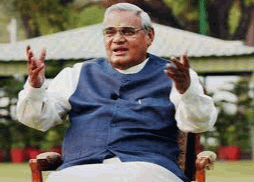Atal Bihari Vajpayee-End of an era
Atal Bihari Vajpayee- True Statesman
International Media Coverage of Atal Bihari demise
CNN
CNN highlighted that the leader does not come under international pressure. "Faced with heavy criticism of India's nuclear ambitions, at home and abroad, Vajpayee rejected the threat of economic sanctions, told Parliament," We have not taken any decision after coming under international pressure and we will never do this in future Will not, "the obituary read.
New York Times
In an obituary named 'Atal Bihari Vajpayee, Former Prime Minister of India, dies at 93', The New York Times described Vajpayee as a strong politician and, 'Prime Minister of India from 1998 to 2004' As a world, the decades-old prevention of the atomic weapon tests has surprised the world.
Washington Post
The Washington Post was told in his obituary entitled 'Atal Bihari Vajpayee', a Prime Minister who made India a nuclear power, died on 93. The article credited Vajpayee for establishing a nuclear weapon state, but also how India's decision to test nuclear weapons impacted its relations with the United States.
Dawn.com
Pakistan's media outlet The Dawn put an obituary named 'Vajpayee, favoring peace with Pakistan', where it was said that Vajpayee was praised in Pakistan as 'honest peacekeeper'.
Atal Bihari and United Nation General assembly speech
The first Foreign Minister, who gave the speech in Hindi at the United Nations General Assembly, Atal Bihari Vajpayee effectively lifted India's stand on important issues such as nuclear disarmament, state-sponsored terrorism, and improvement in the world body.
"I am a newcomer to the United Nations, but India is not actively associated with the organization actively associated with its establishment. Vajpayee said in the historic address, "As a person who has been a Member of Parliament for two decades and more in my country, I first feel the special feeling of happiness in participating in this Assembly of Nations. "
Vajpayee visits United Nations Headquarters to give UNGA speech on seven occasions from 1977 to 2003 in his role as Foreign Minister and Prime Minister. Known for his great explanation skills, Vajpayee addressed the UNGA 32nd session in 1977 under the chairmanship of the Prime Minister Morarji Desai under the Janata Party government.
Born on December 25, 1924 in Gwalior, a humble school teacher in Madhya Pradesh, Vajpayee entered politics in 1942 during the Quit India Movement. He graduated and graduated in Political Science from Victoria College in Gwalior. It is said that Vajpayee, who was also fluent in English, was the force behind raising Hindi on the international stage using Hindi by giving every speech to the United Nations every time.
He touched the theme of the Non-Coalition Movement and said that India "stands firmly for peace, non-alignment, and friendship with all countries."Vajpayee said, "Vashudhaiva Kutumbakam's vision - the world is a family - an old one. We believe in the concept of the world as a family in India."In his speech, he said that India is hoping to strengthen the process of generalization of relations with Pakistan to not only ensure lasting peace but also to promote beneficial bilateral cooperation. This was the first time that an Indian leader had given a speech in Hindi in the UNGA because other Indian leaders had opted to speak on the stage in the English language, the main language.
In 1978, Vajpayee again visited the UNGA as External Affairs Minister and raised the issue of nuclear disarmament."There is no late-up quantitative or qualitative quantity in the race for weapons. Disarmament is still a remote goal, and the possibility of a nuclear war is like a dangerous shadow over us."India believes that there is a possibility of no real sense of security for partial measures such as the creation of nuclear weapon warrior-made zones, and significant progress towards nuclear disarmament," he said.
In 1998, Vajpayee came to give a speech as Prime Minister in the UNGA and then met with Pakistan's Prime Minister Nawaz Sharif in New York."India has shown that democracy can take root in a developing country."I believe the Indian experience will prove that democracy can provide a stable, long-term basis for development in developing societies, this is the path that India has chosen, and I stand in front of the Assembly today, this new The symbol of the resurrection, "he said.
In 2000, Vajpayee appeared once again in UNGA to address the United Nations Millennium Summit. They talked about the threat of terrorism, nuclear war and nuclear programs of India."The threat of atomic war is a serious threat to global peace and security in the new era, whose arrival has been marked by this Summit. Vajpayee said, "India was forced to develop these weapons in 1998 because the major nuclear weapons states refused to accept the almost universal demand of disarmament. Besides, the spread of nuclear weapons in our neighborhood Made us particularly vulnerable. "
He returned in 2001 to address the 56th session of the UNGA and talked about the policy of sponsoring terrorism by some states because a session was being organized in the shadow of 9/11 attacks."We know from our bitter experience in India that terrorists develop a global network driven by religious extremism, whose operations are supported by drug smuggling, money laundering, and weapon smuggling."Some states adhere to the policy of sponsoring and sheltering them, and terrorists can only be considered through the coordinated efforts of the international community."
In 2002, Vajpayee again raised the issue of state-sponsored terrorism and nuclear blackmail in South Asia in his address in the 57th session of the UNGA."In our South Asian region, in the last few months, Atomic Blackmail has emerged as a new arrow in the State-sponsored terrorism quiver. He warned, "There were dark threats that India could incite a nuclear war to prevent cross-border terrorism."
Vajpayee's last address at the UPA came in 2003 when he criticized the world body in the 58th session, "The United Nations has not always been successful in stopping or resolving conflicts and referring to Iraq's example. .He said that "we need to introspect on some assumptions made in the years related to the will and reach of the United Nations.
"We felt that the United Nations does not have magical powers to solve every crisis in all parts of the world or to change the inspiration of the leaders and communities around the world,"Vajpayee said that with the sense of realism, it is necessary to recognize clearly what the United Nations can achieve, and in order to play an optimum role in today's world, changes in form and function are required. 10 times Lok Sabha member, Vajpayee announced his retirement from politics in 2005. He died at New Delhi on August 16, 93 at the age of 93.
Disclaimer/ Credits- Obituary Articles are taken from CNN, New works times, DAWN, Wahington Post. Atal speech in UNGA taken from different websites to give information to the audience. We do not claim for 100 percent originality of the document as information taken from different sources for informational purpose. The image used is also taken from the google search.








Comments